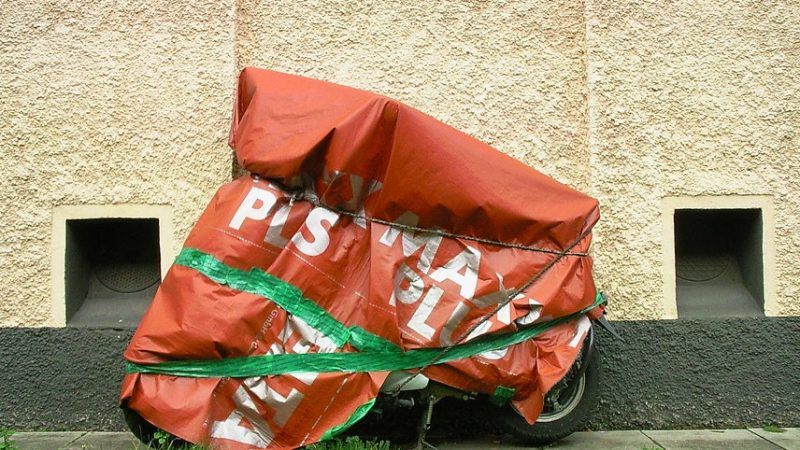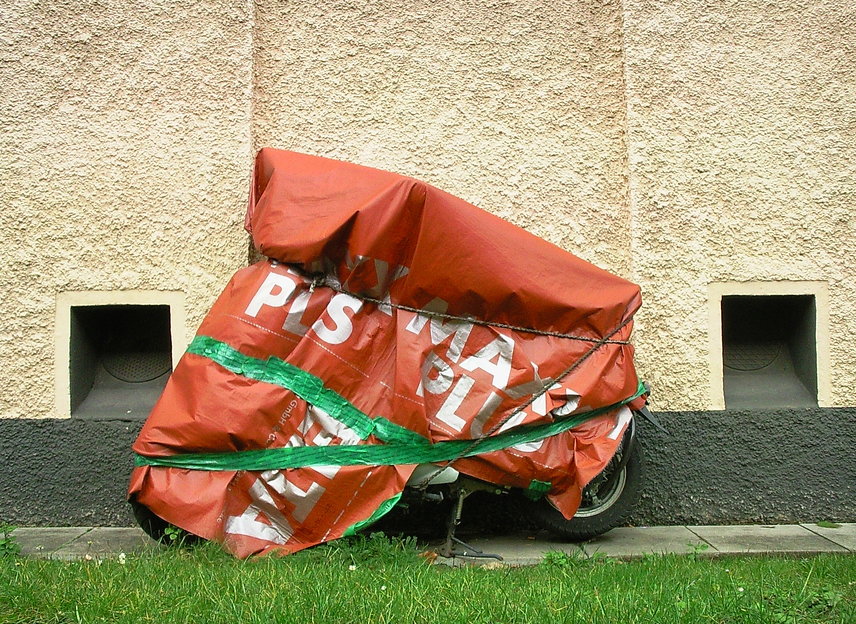Can the 'Automobile Exception' Run Over the Fourth Amendment?
Justices hear challenge to Virginia court's expansion of warrantless vehicle searches.


The Supreme Court has long held that police don't need a warrant to search a motor vehicle if they have probable cause to think it contains evidence of a crime. But does the so-called "automobile exception" apply to a vehicle parked in a location that would ordinarily require a warrant to access?
In a strikingly broad ruling in 2015, the Supreme Court of Virginia said it did. Going beyond the nationwide rule that cars can be searched without a warrant—a doctrine based on the fact that their mobility makes it easier to move or destroy important evidence before a warrant is issued—the Virginia justices held in Collins v. Virginia that the automobile exception trumps even the Constitution's requirement that police must have a warrant to search a home.
The case was then appealed to the U.S. Supreme Court, which heard oral arguments yesterday. The outcome could have wide implications for Americans' Fourth Amendment rights.
The story began when a police officer, without a warrant or consent, walked up a private driveway and lifted a tarp off a motorcycle parked in a partially enclosed car-port connected to the back of a house. The officer was looking for a distinctive motorcycle whose rider had previously eluded him at high speed, but a check of the VIN number revealed that the bike was stolen. Having found this evidence, the officer arrested Ryan Collins, whose girlfriend lived in the home.
Collins wants to suppress the evidence, arguing that it was the fruit of an illegal search. If such searches are permitted, Collins' lawyers and a number of pro-privacy groups argue, the suspected presence of a vehicle could be used as a pretext for warrantless searches of nearly any location.
In yesterday's oral arguments, several justices seemed skeptical of Virginia's reasoning. As Chief Justice Roberts noted, the state's doctrine could theoretically authorize a warrantless search of Jay Leno's house based on the presence of cars inside. When Justice Sonia Sotomayor asked Acting Virginia Solicitor General Trevor Cox if he thought "the police can break into anything, go anywhere where they see the car, whether they [are] at that place legitimately or not," Cox answered "yes"; that prompted Justice Neil Gorsuch to interject sharply that such a rationale would suggest that the Court should overrule cases "going all the way back to the founding."
Appealing to that skepticism, Collins' attorney closed his arguments by cautioning the justices that "the automobile exception is literally knocking at the door of the house."
Editor's Note: As of February 29, 2024, commenting privileges on reason.com posts are limited to Reason Plus subscribers. Past commenters are grandfathered in for a temporary period. Subscribe here to preserve your ability to comment. Your Reason Plus subscription also gives you an ad-free version of reason.com, along with full access to the digital edition and archives of Reason magazine. We request that comments be civil and on-topic. We do not moderate or assume any responsibility for comments, which are owned by the readers who post them. Comments do not represent the views of reason.com or Reason Foundation. We reserve the right to delete any comment and ban commenters for any reason at any time. Comments may only be edited within 5 minutes of posting. Report abuses.
Please to post comments


Collins wants to suppress the evidence, arguing that it was the fruit of an illegal search.
Someone watched Law & Order.
You can earn more than $15,000 each month from you home, and most special thing is much interesting that the job is to just check some websites and nothing else. Enjoy full time and money freedome, also an awesome career in you life....
just click the link given belowHERE..... http://www.startonlinejob.com
The cop got too lazy to put together his parallel construction first.
Start earning $90/hourly for working online from your home for few hours each day... Get regular payment on a weekly basis... All you need is a computer, internet connection and a litte free time...
Read more here,..... http://www.startonlinejob.com
Start earning $90/hourly for working online from your home for few hours each day... Get regular payment on a weekly basis... All you need is a computer, internet connection and a litte free time...
Read more here,..... http://www.startonlinejob.com
I think we can actually cobble together a majority on this! Very good things are in store, especially if we get a Kennedy retirement and/or a Ginsburg...retirement.
.
Just imagine where we'd be now with that deferential piece of shit "moderate" Merrick Garland, a "compromise" far worse than any "liberal extremist." I can scarcely believe a human being as beautiful and perfect as Neil Gorsuch even exists, let alone that we got him anywhere near SCOTUS.
Are you for real dude?
I really don't hold out high hopes that the next nominee will be even remotely as reasonable. And unlike most of the basically-Republicans around here I don't think decisively tipping the balance of the court that way is a good thing anyway.
Like FDR did?
Can the 'Automobile Exception' Run Over the Fourth Amendment?
Hm...
**Reads 4A**
I don't see an exception.
a doctrine based on the fact that their mobility makes it easier to move or destroy important evidence before a warrant is issued
Irrelevant as it pertains to the constitution. But I'm just a layman that simply reads the words. I suppose I need the decoder ring that lawyers and judges seem to have.
Is the ring gold, with FYTW emblazoned on it in diamonds?
That's the one. With the chick on the other side all dressed up in a nightgown, and blindfolded for a little B&D.
a doctrine based on the fact that their mobility makes it easier to move or destroy important evidence before a warrant is issued
Irrelevant as it pertains to the constitution. But I'm just a layman that simply reads the words. I suppose I need the decoder ring that lawyers and judges seem to have.
I also need some .22lr for the squirrels.
Step up to .22-250. That way they never see it coming.
Shades of Mabel Walker Willebrandt, "The Prohibition Portia" described by H.L. Mencken, who argued the Marron, Haar, Frances and Louise, and Manly Sullivan cases in which the Force Amendments (16 and 18) crushed the Bill of Rights underfoot. But back then there was no LP...
I just wish it was a sympathetic victim. Like a crack dealing gang member. High speed motorcycle thief? Hard to root for.
Everyone roots for them on the news in LA.
a doctrine based on the fact that their mobility makes it easier to move or destroy important evidence before a warrant is issued
A briefcase is also an easy way to move evidence from one place to another. But you can't fucking search one without a warrant. Unless a lawyer wants to correct me on that.
Cops can search anyone at anytime and no one will stop them. Unless you can afford an attorney to point out the crimes committed by the cop, you will be considered guilty until proven innocent. No matter what the criminal cops will keep doing whatever they want.
Unless that briefcase is in your hand in an airport, courthouse, federal building, museum, etc.
Or the cops just feels like it, and you have it outside your house.
The only chance that briefcase has is if it is locked inside a closet inside your locked house and the K-9 that 'triggers' on command is busy across town.
Almost any K9 will do; they all trigger when they hear "treat".
Cox answered "yes"; that prompted Justice Neil Gorsuch to interject sharply that such a rationale would suggest that the Court should overrule cases "going all the way back to the founding."
Hmmm. Something tells me I'm going to end up liking this guy.
Not as much as DiegoF upthread.
SCOTUS bromance?
Oooohhh !!!! You missed this link:
Amicus Brief Cites Ferris Bueller to Great Effect
Not too late to update the story, Mr Alt Tex Intern!
Reasonable suspicion. Probable cause is for making an arrest.
Wow. That's pretty appalling.
Whats the difference between lifting a tarp and opening a door? slippery slopes
Seems like they're saying you can just enter a garage for sure.
Imagine if this guy had parked his motorcycle inside the house. I presume the cop could have broken in.
Cops shouldn't worry too much. If they want to search someone's car, or the house whose garage it sits in, they can always just shoot the people who live there. Seems to be the easiest way to get out of such pickles.
That's the way it works under socialism in my experience.
Like the Pueblo, the alleged bill of rights is long gone.
So following the state's logic, double-wides don't qualify for protections at all. Seems a little classist, nevermind people who live in vans by the river.
And given how badly the automobile exception has been misused, I wonder if the justices will reel in some of the extravagances. Stronger protections could upend civil forfeiture in a single stroke.
Of course not. How can the loving embrace of the state help those ignorant fools who live in trailers if the state can't intrude on all parts of their private lives?
Welcome to progressivism!
A trailer doesn't have a motor, so I don't think that counts.
Thought the doctrine was "in plain sight". Something in a carport covered by a tarp really should not be considered "in plain sight".
Maybe that should make him realize there isn't an exception.
What fourth amendment?
Compared to asset theft, I mean forfeiture, this is nothing.
Compared to total electronic monitoring, this is nothing. Compared (well, you get the idea)
Sounds to me like the judges are going to come down on the right side of this argument, thank god.